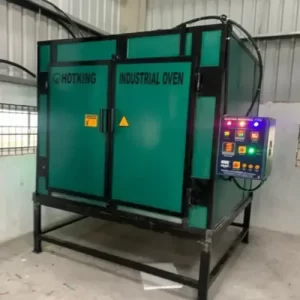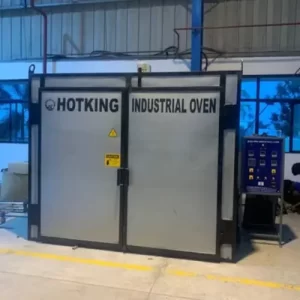How to Use an Industrial Oven:
Industrial ovens play a crucial role in various industries, from manufacturing and pharmaceuticals to food processing and laboratories. Whether curing, drying, baking, or sterilizing, these ovens offer precision, efficiency, and reliability. However, to ensure optimal performance, safety, and longevity, it’s important to understand how to use an industrial oven correctly. At Hotking Instruments, we specialize in designing and manufacturing high-quality industrial ovens that meet the diverse needs of industries across India and beyond. In this guide, we’ll walk you through the key steps involved in operating an industrial oven safely and efficiently.

What is an Industrial Oven?
An industrial oven is a heated chamber used for a variety of heat treatment processes. These ovens operate at higher temperatures than domestic ovens and are built to handle large-scale operations. Common uses include:
- Curing: Hardening materials like coatings, adhesives, or rubber.
- Drying: Removing moisture from components or raw materials.
- Baking: Heating substances to induce chemical or physical changes.
- Sterilizing: Eliminating bacteria or contaminants from tools and materials.
Hotking Instruments offers a wide range of industrial ovens including tray dryers, conveyor ovens, and custom-built high-temperature ovens to suit specific industrial applications.
Step-by-Step Guide: How to Use an Industrial Oven
Read the User Manual
Before operating any industrial oven, it’s essential to thoroughly read the manufacturer’s manual. Each oven has its specific features, safety guidelines, and operating instructions. At Hotking Instruments, we provide a detailed manual with every unit to ensure smooth and safe operations.

Understand the Control Panel
Modern industrial ovens come with digital control panels that regulate:
- Temperature settings
- Time duration
- Fan speed (if applicable)
- Heating zones
- Safety alarms
Get familiar with each button and setting before starting the oven.
Prepare the Oven
Before loading materials:
- Make sure the oven chamber is clean and free from residue.
- Check that the shelves or trays are properly aligned.
- Preheat the oven if required by your process.
Hotking Instruments designs ovens with easy-clean interiors and durable trays for consistent heat distribution.
Load the Materials Properly
Improper loading can lead to uneven heating. Follow these tips:
- Spread items evenly across trays without overcrowding.
- Leave adequate space for airflow around each item.
- Avoid stacking items unless your oven design allows it.
Use heat-resistant containers if necessary, and ensure the materials are compatible with the set temperature.
Set the Temperature and Time
Using the digital controller:
- Input the desired temperature based on your process.
- Set the timer or use a manual switch depending on the oven model.
- For processes like drying or curing, consult your material specifications.
Hotking Instruments’ ovens are built with PID temperature controllers that maintain precise and consistent heat levels.
Start the Oven
Once settings are confirmed:
- Close the door securely to prevent heat loss.
- Press the “Start” or “Run” button.
- Monitor the oven as it reaches the set temperature (preheating time may vary).
Some ovens come with indicator lights or alarms to notify you when the set temperature is achieved.
Monitor the Process
Even though industrial ovens are automated, regular monitoring is essential:
- Check for temperature fluctuations.
- Watch for any unusual sounds or smells.
- Use inspection windows or temperature probes for internal checks.
Hotking Instruments includes safety features like overheat protection, auto shutoff, and digital displays in all industrial ovens.
Unload Carefully
Once the cycle is complete:
- Turn off the oven and allow it to cool down (depending on the material).
- Use heat-resistant gloves to remove trays or items.
- Avoid direct contact with the hot interior walls.
Wait until the oven reaches a safe temperature before performing cleaning or maintenance.
Clean After Use
Regular cleaning ensures long-term durability:
- Wipe down interiors with a dry cloth (use a damp cloth only when the oven is cool).
- Remove any residues or material spills.
- Clean filters or fans (if applicable) as per the user manual.
Hotking Instruments designs ovens with non-corrosive stainless-steel interiors for easy maintenance.
Maintenance Tips
Proper maintenance prolongs the oven’s lifespan:
- Schedule periodic servicing as recommended.
- Inspect electrical components regularly.
- Calibrate temperature sensors as required.
- Lubricate moving parts if specified in the manual.
Hotking Instruments provides AMC (Annual Maintenance Contracts) and dedicated support to ensure your equipment stays in top shape.
Safety Guidelines While Using Industrial Ovens
Safety is a top priority when working with high-temperature equipment. Here are some best practices:
🔹 Use Personal Protective Equipment (PPE)
- Heat-resistant gloves
- Safety goggles
- Long-sleeved clothing
🔹 Maintain Proper Ventilation
Ensure your workspace is well-ventilated, especially when working with volatile substances.
🔹 Avoid Flammable Materials
Do not place flammable or explosive materials in the oven unless it’s specifically designed for such purposes.
🔹 Never Leave Unattended
While modern ovens have auto shutoff features, always keep an eye on the process during operation.
🔹 Emergency Shutdown
Know the location of emergency switches and fire extinguishers. In case of a fire or fault, shut down the oven immediately.
Hotking Instruments incorporates built-in safety systems like:
- Over-temperature cut-off
- Emergency stop switches
- Fault alarms
Applications of Industrial Ovens
Industrial ovens are used across multiple sectors. Some common applications include:
✔️ Pharmaceuticals
Sterilizing glassware and instruments, drying granules or powders.
✔️ Electronics
Curing epoxy resins, solder reflow processes, and component drying.
✔️ Metal Industry
Preheating, annealing, powder coating.
✔️ Food Processing
Dehydrating ingredients, and baking non-edible samples (lab testing).
✔️ Research Laboratories
Heat testing, chemical compound curing, and material studies.
At Hotking Instruments, we customize ovens for specific industry needs, whether you require lab-scale models or large-batch ovens for industrial production.
Why Choose Hotking Instruments?
With over a decade of experience in manufacturing laboratory and industrial heating equipment, Hotking Instruments is a trusted name in the industry. Here’s what sets us apart:
- ✅ Custom-Built Designs: We understand that one size doesn’t fit all. Our ovens are tailored to your specific application.
- ✅ Precision Engineering: From uniform heating to tight temperature control, our ovens are built for consistent results.
- ✅ Advanced Safety Features: We prioritize operator safety and machine durability.
- ✅ After-Sales Support: Our team offers full support, installation guidance, and AMC services.
- ✅ Made in India: Proudly manufactured with international quality standards.
Conclusion
An industrial oven is an essential tool in various industries, but it needs to be used correctly for optimal performance and safety. Hotking Instruments is here to support your business with the best-in-class industrial ovens tailored to your needs. Whether you’re drying, curing, sterilizing, or baking, our ovens deliver the precision and reliability you can trust.
